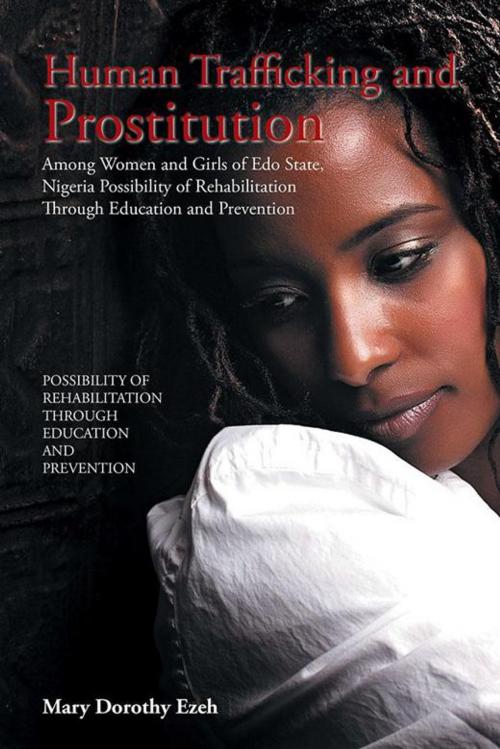Human Trafficking and Prostitution Among Women and Girls of Edo State, Nigeria Possibility of Rehabilitation Through Education and Prevention
Nonfiction, Social & Cultural Studies, Social Science| Author: | Mary Dorothy Ezeh | ISBN: | 9781524597085 |
| Publisher: | Xlibris UK | Publication: | June 6, 2017 |
| Imprint: | Xlibris UK | Language: | English |
| Author: | Mary Dorothy Ezeh |
| ISBN: | 9781524597085 |
| Publisher: | Xlibris UK |
| Publication: | June 6, 2017 |
| Imprint: | Xlibris UK |
| Language: | English |
Even though this study was primarily on human traffi cking and prostitution among Edo women and girls of Edo state in Nigeria, human traffi cking, however, is a widespread, visible phenomenon in the world today. It is a global problem. A report from United Nations Offi ce on Drug and Crime in 2014 says that human traffi cking involves over three million people in the world, bringing their slaveholders an annual profi t of 32 billion dollars. According to the same report, there is no place in the world where children, women, and men are safe from human traffi cking. In the background, the stark reality of poverty, unemployment, social marginalization, political crises, wars, interethnic confl icts, and the militarization of entire territories has increased the massive displacements of the population, fuelling the illegal sex trade linked to them. Many youngsters who desire to improve their living conditions and those of their families fl eeing their homes often become prey to criminal organizations who take advantage of them, exploit them, and dehumanize them. Little do they know when they are leaving their homes to go to overseas, what is waiting for them is often something altogether diff erent, namely intimidation, blackmail, violence, nightmare, and slavery that strip them of all dignity and respect. To make matters worse, most of the victims and their families not only lose credibility but are also ostracized by their local communities when what happened comes to light. Th erefore, the victims of this painful chain are not only young girls and boys but also families. Unfortunately, some parents, especially mothers, have also been perpetrators of this deplorable crime. Th ey push their daughters into the arms of their torturers, lulled by the dream of a brighter future. To stop and to prevent the reoccurence of this criminal network of complicity, which has been more or less voluntary, conscious and unconscious, a joint commitment by all governments, organizations, local communities, and individuals is necessary. Everyone needs to remember and never forget that every human being, every person has been created and procreated in the image and likeness of God and is a subject of essential rights, which should never be violated but rather should be respected and upheld by everyone in every time and place.
Even though this study was primarily on human traffi cking and prostitution among Edo women and girls of Edo state in Nigeria, human traffi cking, however, is a widespread, visible phenomenon in the world today. It is a global problem. A report from United Nations Offi ce on Drug and Crime in 2014 says that human traffi cking involves over three million people in the world, bringing their slaveholders an annual profi t of 32 billion dollars. According to the same report, there is no place in the world where children, women, and men are safe from human traffi cking. In the background, the stark reality of poverty, unemployment, social marginalization, political crises, wars, interethnic confl icts, and the militarization of entire territories has increased the massive displacements of the population, fuelling the illegal sex trade linked to them. Many youngsters who desire to improve their living conditions and those of their families fl eeing their homes often become prey to criminal organizations who take advantage of them, exploit them, and dehumanize them. Little do they know when they are leaving their homes to go to overseas, what is waiting for them is often something altogether diff erent, namely intimidation, blackmail, violence, nightmare, and slavery that strip them of all dignity and respect. To make matters worse, most of the victims and their families not only lose credibility but are also ostracized by their local communities when what happened comes to light. Th erefore, the victims of this painful chain are not only young girls and boys but also families. Unfortunately, some parents, especially mothers, have also been perpetrators of this deplorable crime. Th ey push their daughters into the arms of their torturers, lulled by the dream of a brighter future. To stop and to prevent the reoccurence of this criminal network of complicity, which has been more or less voluntary, conscious and unconscious, a joint commitment by all governments, organizations, local communities, and individuals is necessary. Everyone needs to remember and never forget that every human being, every person has been created and procreated in the image and likeness of God and is a subject of essential rights, which should never be violated but rather should be respected and upheld by everyone in every time and place.















